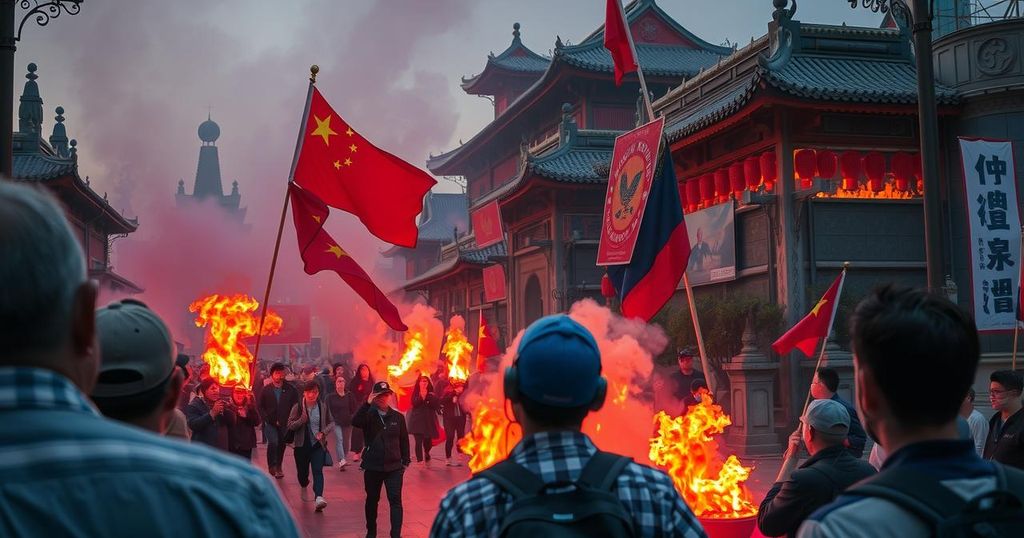Surge of Mass Attacks in China: A Reflection of Societal Anger and Economic Strain
In 2024, China experienced a significant increase in mass attacks, with 19 incidents recorded, reflecting a surge in public anger linked to economic struggles and limited avenues for dissent. High unemployment and societal repression have led to feelings of despair among citizens. Experts warn these conditions could lead to further instability as the government struggles to manage rising tensions in society.
In 2024, mass attacks in China have surged alarmingly, prompting widespread concern regarding the underlying societal malaise. While violent incidents remain unusual relative to China’s vast population, this year’s count soared to 19 incidents, significantly higher than the three to five yearly average recorded from 2019 to 2023. These acts of violence have often been perpetrated by individuals expressing profound discontent with societal conditions, marking a notable uptick in public anger that has become increasingly visible.
The reasons behind this escalation appear multifaceted, with the sluggish economy emerging as a primary contributor. A combination of high youth unemployment, rising debt, and a deteriorating real estate sector has left many feeling trapped in an unyielding economic environment. George Magnus, a research associate at Oxford University’s China Centre, noted that economic and social repression has created a cycle of despair, causing many to reconsider their opinions on societal inequality and injustice.
Furthermore, traditional avenues for voicing grievances within a heavily controlled media landscape have become increasingly restricted. As outlined by political science professor Lynette Ong, opportunities for small-scale protests and online dissent have diminished, with authorities responding to such activities with heightened censorship and crackdowns. The bullying response to dissenting opinion, coupled with inadequate mental health services, has only exacerbated the emotional strain experienced by the populace.
Public sentiment reflects a palpable dissatisfaction with the current government’s inability to navigate and resolve these grievances. Increasingly, citizens are voicing a belief that the government’s superficial attempts at harmony have failed to address the underlying injustices. Following a violent incident in Zhuhai, President Xi Jinping acknowledged rising tensions and urged local officials to proactively mitigate conflicts and prevent similar extreme acts of violence. However, the current focus appears to be on enhanced policing and surveillance rather than a comprehensive reassessment of social policies.
As the landscape in China gathers additional tension, experts caution that the country may be entering a period of unexpected social instability characterized by random acts of violence and expressions of public dissent. Hence, the government’s perception of these events could significantly shape its future policies and responses. If left unaddressed, these bubbling frustrations may pose broader challenges to both governance and social stability.
The article examines a concerning rise in mass attacks in China during 2024, emphasizing that this uptick occurs against a backdrop of a stagnant economy and growing societal discontent. With recorded cases of mass violence escalating dramatically, experts suggest these incidents reflect deeper issues within Chinese society, including widespread feelings of entrapment due to economic pressures and restricted outlets for expressing grievances. Importantly, the piece emphasizes the lack of adequate mental health resources, which further complicates individuals’ coping mechanisms in a challenging environment.
The escalation of mass attacks in China during 2024 signals a growing societal crisis rooted in economic despair and restricted avenues for dissent. Despite the government’s attempts to address public grievances through increased surveillance and policing, this approach may not alleviate the deeper frustrations brewing among citizens. Without significant changes to address economic inequality and provide mental health support, the potential for further violence and unrest looms large in Chinese society. Addressing these underlying issues will be crucial to fostering a more stable social environment moving forward.
Original Source: www.bbc.com








Post Comment